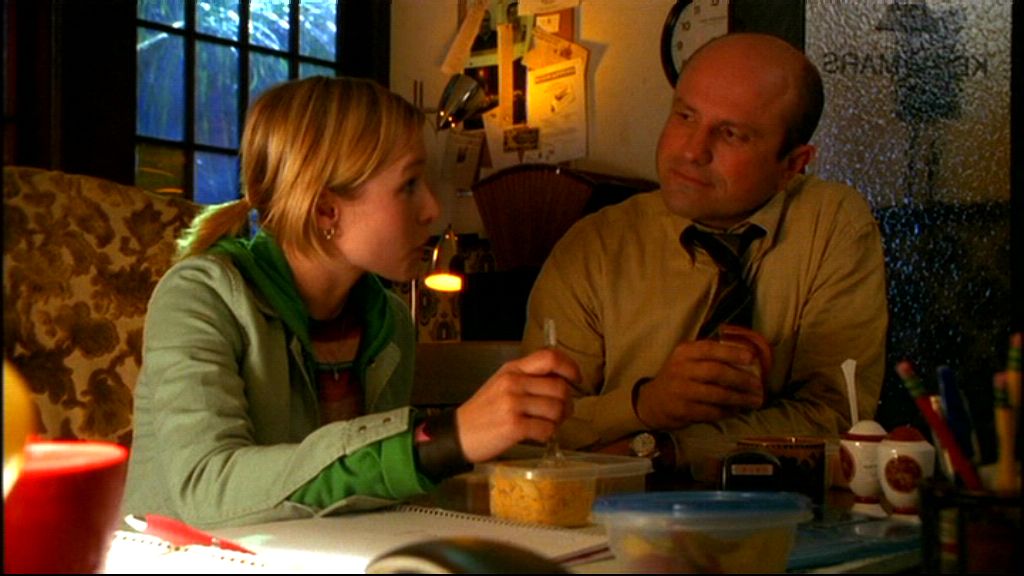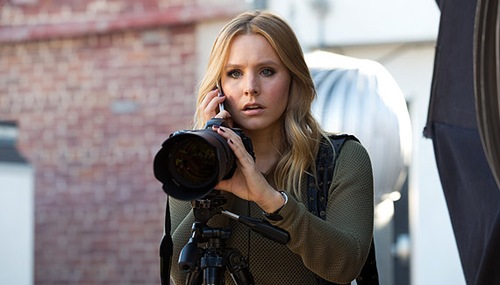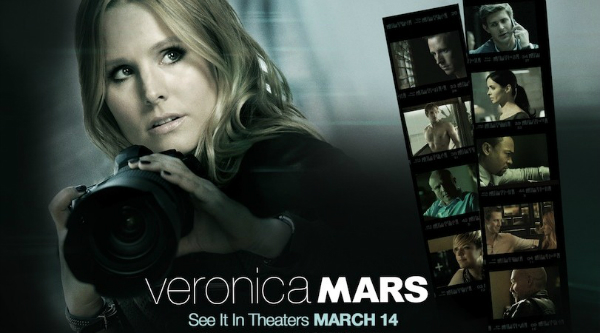Frequently repeated lines:
Keith Mars: Hey…who’s your daddy?
Veronica Mars: I hate it when you say that
There was a lot of talk about Veronica Mars this week.
If you’re anything like me, you’ve read countless tributes. 1000 words here, 500 there on the class wars , miscarriages of justice and police corruption on the show that got us talking, agonizing and gleefully applying story lines to our own political climate. Tumblr raves praising the series for taking its audience seriously: delivering compelling season-long mysteries as well as episodic ones, developing character far beyond labels of good and bad, rich and poor, and committing to a dark, noir tone not often seen on a teen drama. As explored elsewhere on Bitch Flicks, Veronica Mars was also unprecedented for putting a rape survivor at the centre of a high school-set series.
Mainly though, the movie’s release has reminded us of all the supposedly simple and universal things the show portrayed so well, the things that shouldn’t be notable in today’s movies and TV, but somehow are: a platonic male-female relationship, a strong friendship between teen girls who never came to blows over looks or boys, a willingness to hold its heroine accountable for her flaws, and above all, an amazing father-daughter relationship.

Sadly neglected in the movie, where Keith Mars (Enrico Colantoni) stepped in periodically to guide Veronica (Kristen Bell) between set pieces, their relationship was notable for the great deal of understanding within it. Throughout the series, Keith was a great friend to trade sarcasm and snark with, a colleague to discuss investigations with, a partner to help make major life decisions, but never forgot his role as a parent. Even when it led to fights and weeks of radio-silence, Keith was capable of stepping out of his friend role to dish out groundings, forbid self-destructive and often criminal antics, and (attempt to) quash romantic and platonic relationships he believed capable of robbing his bright, shining daughter of her light. He always respected Veronica and her interests, independence and what’s more, genuinely liked and appreciated her as a person. Back in season one, the depth of Keith’s unconditional love was clear when we learned he had been unsure whether Veronica was biological daughter for quite some time though never let the uncertainty color his feelings for her.
It bears repeating that nuanced, complicated and respectful relationships between fathers and daughters are disturbingly rare on our screens these days. As most of us know from our everyday lives, there’s no shortage of great stories within the father-daughter (or father figure-daughter) dynamic.
Sure mother-daughter stories are important too and there are so many movies, so many TV shows that have given us mother-daughter relationships to cherish. And in every variation: jealously of the daughter’s youth coming from the mother, jealously of her mother’s independence from the daughter, disturbing romantic rivalry, close friendship that borders on symbiosis, a mother’s disappointment that her daughter is not a mini-version of herself and the mother who worried that her daughter will make the same mistakes she did (Lauren Graham seems to have made a cottage industry out of these roles in Gilmore Girls and Parenthood), and many more. You name a variation and someone’s made something about it.
All the talk about the Veronica Mars Movie got me thinking about the kind of story lines we generally see between fathers and daughters. The general population of TV dads are bumbling idiots, who don’t know their kid’s bedtimes or whether or not to give them sugary snacks. As a group, they lag behind TV mothers, who are most often called upon to play bad-cop against the over-grown man-children they married.
Fatherhood in movies brings to mind disapproving curmudgeons, gruff off-duty cops wielding a shot gun on their daughter’s dates or an absence commonly used as a ham-fisted explanation of why the female character likes older men or works as a stripper. In a growing sub-genre of action movies, it falls to a father to get revenge for his daughter’s rape or murder or try to save her (Taken, The Limey, Traffic ). 2010’s Winter’s Bone was notable for reversing this common narrative.
A young woman’s relationship with her father is rarely the focus of a narrative unless the mother is out of the picture. Usually she’s been killed off, sometimes she left the family or is somehow ill, often she chose to focus on work over family (a plot line used to make a negative point about women in the workforce).
It seems like his role is only allowed to be prominent in his daughter’s life if he is the sole parent, he can shape her only if there are no other options. Most often the single father as a character is used to explain why the female lead is a tomboy or to delve into his discomfort addressing the sex talk and menstruation. As a character, it’s unusual for the married father to do the heavy lifting or even do his share in an equal partnership. Sadly these story lines may mirror mainstream ideals of real life, where a man taking care of his children or showing an interest in his daughters is seen as effeminate or labelled as “Mr. Mom”.
Thinking about this, I made a list of notable and interesting father-daughter relationships, presented here in no particular order. Got any additions to the list? Let me know in the comments.

Scout and Atticus Finch, To Kill a Mockingbird: Atticus Finch (Gregory Peck) is really a prince among fathers. Determined to teach his children to be good citizens who believe in fair treatment for all and are willing to take a stand for it, Atticus provides a great example. As a father to Scout (Mary Badham), he respects her tomboy identity and tries hard to allow her to have a childhood fun of innocent games, in the midst of important lessons. But he knows the way to raise her right is not shield her from tragedy and allow her to be naive about the injustice in the world. Notably for the time period, he doesn’t hold Scout and his son Jem to separate standards or unduly protect Scout as a member of the ‘weaker sex’. He holds both his children to a high standard and expects them use what they have learned in the adult world.
Howard and Samantha Newly, Samantha Who: In a twist on a common rift between fathers and daughters, Howard (Kevin Dunn) explains to an adult amnesiac Samantha (Christina Applegate), that they stopped being close when she hit puberty and stopped being the bright eyed little girl who followed him around and wanted to inherit his chicken farm one day. Unfortunately for Howard, the changes in Samantha went further than a concern for boys and fashion and she became a truly vile person, attempting to humiliate her parents at every opportunity. Rebuilding her life and trying to becoming a better person, Samantha must make amends with her father and gradually teach him to trust her again.

Richard and Olive Hoover, Little Miss Sunshine: Though he’s striving to be a motivational speaker, Richard (Greg Kinnear)’s greatest challenge may be supporting his seven-year old daughter, Olive (Abigail Breslin), who wants nothing more than to be a beauty queen. Like every father, he wants to believe his daughter is the most beautiful little girl out there, but the very fact of a beauty pageant makes it clear to him that she can’t compete and he’s certain she will be humiliated. But Olive has a trick up her sleeve, a risqué dance performance and the uproar caused by it, leads Richard to abandon his worries and join her on stage, preventing official from stopping her. Richard truly becomes a supportive father, after, when instead of lecturing Olive, he tells her how proud her late grandfather would be of her.

Tony and Meadow Soprano, The Sopranos: Tony (James Gandolfini)’s relationship with his daughter is complex: on one hand, she’s his smartest, most hard-working child, the one who reminds him of all the things he likes about himself, but on the other, she’s the girl. In the world of old-fashioned, frequently misogynistic values Tony inhabits, this means she’s always going to be second best and must be kept virginal. Like other fathers with Tony’s value system, protecting his daughter drives him to do despicable things, like threatening her half jewish, half black boyfriend. But the degree to which Tony values Meadow (Jamie-Lynn Sigler) and sees her as his great hope for a legacy (he dreams of her becoming a pediatrician), is one of the areas where he chafes against his mob lifestyle throughout the course of the series.
Mel and Cher Horowitz, Clueless: As a modern day update of Jane Austen’s Emma, Beverly Hills schoolgirl Cher (Alicia Silverstone) plays nursemaid to her father (Dan Hedaya), reminding him of his high cholesterol, planning his wardrobe and his birthday parties. A successful litigator, he scares and intimidates nearly everyone he comes into contact with, except Cher, who has learned to use negotiation tactics against him and usually gets her way. As no mention is made of Cher’s college prospects or the value she personally sees in good marks, her efforts to raise her grades seem intended to make him proud of her, something she values above all else.

Matt and Alex and Scottie King, The Descendants: It takes an accident that leaves Elizabeth, his wife, comatose to bring Matt (George Clooney) together with his daughters. Alex (Shailene Woodley), his elder daughter is a rebellious teenager that he was previously unable to understand, while Scottie (Amara Miller) behaves inappropriately with other children. The real story of the movie, is Matt’s connection to Alex which strengths through the tragedy as he comes to respect his daughter and she her as a person independent from him. In the search for Elizabeth’s lover, Alex reveals her ingenuity and her continuing loyalty to him even when their bond was troubled. Ultimately restructuring their family as a three-person unit, the King’s learn to rely on each other and find solace even in the hardest times.
Mac and Juno MacGuff, Juno: Mac (J.K. Simmons) supports Juno (Ellen Page) through two adult situations she is in no way prepared for: having a baby and falling in love. He’s always there for her and his wise, though ornery talks help her to work towards mature decisions and provide turning points for her character. He has a sense of humor about everything that’s happening, something he’s clearly passed down to his daughter and provides just the right balm to soothe, (though realistically not eliminate) her pain.

Homer and Lisa Simpson, The Simpsons: Homer (Dan Castellaneta)’s struggles to connect with Lisa (Yeardley Smith), lead to some of the most heart-warming episodes of the series. Homer is cartoonishly dumb even for a cartoon and Lisa’s genius IQ and sophisticated interests make her completely alien to him. On several occasions he breaks his back to make her dreams come true, notably taking a demeaning second job to get her the pony of a little girl’s dream. When he becomes temporarily intelligent after removing a crayon from his brain, Homer is able to see what Lisa’s life is like and comes to respect her strength in a way that was impossible before. Likewise, in each Homer-Lisa episode, Lisa gains a new appreciation of the sacrifices Homer makes for her happiness. However, because of the show’s format, any progress Homer and Lisa make understanding each other, resets by the end of the episode.
Clancy and George Lass, Dead Like Me: It is only after her death that grim reaper George (Ellen Muth) comes to understand her father, a man she hasn’t given a lot of thought to since she was a child. Sitting in on the poetry class he teaches, she comes to understand him as a person and to identify with him. Clancy (Greg Kean) is never shown as a great dad, already introverted to a fault, his grief over George’s death leads him to shut everyone out and ultimately, he has an affair and leaves his wife and surviving daughter. But George’s glimpse of him as an imperfect person, who loved her very much but had no idea how to show it, mirrors the realizations many of us have about our parents at some point as we grow up.

Jack and Andie Walsh, Pretty in Pink: To a teenager’s mind, anything wrong in her life her parents’ fault. As the chief conflict in Pretty In Pink is Andie (Molly Ringwald)’s status as a girl from “the wrong side of the tracks”, it’d be easy for her to see her underemployed father as a one-dimensional villain, keeping her from a better life. But through a painful confrontation scene, it becomes clear that Jack (Harry Dean Stanton) is still depressed about Andie’s mother leaving them and is so broken he is unable to move on and give his daughter what she needs. So far in her life, Andie has been the more mature of the pair, the one who’s forced to take care of him. It’s a difficult situation, but it’s an honest one and Jack and Andie’s conversation gives hope that things might get a least a bit better in the end. As Andie prepares her new look for prom, attempting to change her life, it’s clear Jack has also changed, symbolically moving on from his wife by putting her picture in a drawer.
More fathers and daughters:
Harold and Lindsay Weir, Freaks and Geeks
Sam Sotto and Carol Solomon, In A World…
Jake and Daria Morgendorffer, Daria
Damon and Mindy Macready, Kick-Ass
George and Tessa Altman, Suburgatory
Murray and Vivian Abromowitz, Slums of Beverly Hills
Disney Movies: Fa Zhou and Fa Mulan in Mulan, Maurice and Belle in Beauty and the Beast, King Triton and Ariel in The Little Mermaid
Also on Bitch Flicks: A Long Time Ago, We Used to be Friends: The Veronica Mars Movie, The Relationships of Veronica Mars
__________________________________________________________
Elizabeth Kiy is a Canadian writer and freelance journalist living in Toronto, Ontario. She recently graduated from Carleton University where she majored in journalism and minored in film.













